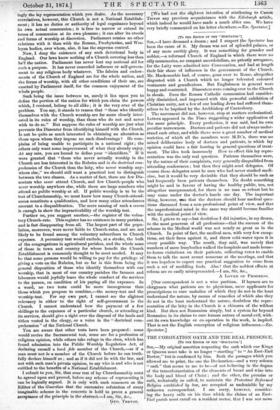[TO THE EDITOR OF THR SPECTATOR:] Sin,—I have dreamed a
dream ; and I suspect the Spectator has been the cause of it. My dream was not of splendid palaces, or of any mere earthly glory. It was something far grander and nobler,—a reformed Church of England in which there were no silly mummeries, no rampant sacerdotalism, no priestly arrogance, for the Laity were admitted into Convocation, and had at length their fair share of influence in the government of the Church. Mr. Mackonochie had, of course, gone over to Rome, altogether disgusted with a Church which no longer tolerated coloured vestments and genuflexions. But Englishmen in general were happy and contented. Dissenters were coming over to the Church in shoals. Even the Roman Catholic communion had consider- ably diminished, and impressed with this powerful exhibition of Christian unity, not a few of our leading Jews had suffered them- selves to be baptised by the Archbishop of Canterbury.
The movement did not, however, stop at matters ecclesiastical. Letters appeared in the Times suggesting a wider application of the same principle. Every profession, it was said, had its own peculiar narrowness. Doctors and patients did not always under- stand each other, and while there were a great number of medical societies, of which all the members were M.D.'s, there was no mixed deliberative body of doctors and patients, in which lay opinion could have a fair hearing in general questions of treat- ment. The idea took immensely How to effect this lay repre- sentation was the only real question. Patients themselves were, by the nature of their complaints, very generally disqualified from attending conferences ; but then they might send delegates. Of course these delegates must be men who had never studied medi- cine, but it would be very desirable that they should be such as had frequently been patients themselves. No doubt something might be said in favour of having the healthy public, too, not altogether unrepresented, for there is no man so robust but he may come under the doctor's hands one day. The important thing, however, wias that the doctors should hear medical ques- tions discussed from a non-professional point of view, and that the unprofessional mind in the same way should become familiar with the medical point of view.
Sir, I grieve to say—but doubtless I did injustice, in my dream, to the most generous of all professions—that the success of the scheme in the Medical world was not nearly so great as in the Church. In point of fact, the medical men, with very few excep- tions, set their faces against it, and threw cold-water upon it in every possible way. The result, they said, was merely that numbers of mere busybodies walked the hospitals and made house- to-house visitations on their patients, collecting votes to enable them to talk the most arrant nonsense at the meetings, and that it was hopeless to expect one practical suggestion to come from such a set of meddling fools. Alas ! that the noblest effoits at reform are so easily misrepresented.—I am, Sir, &c.,
A LOVER OF PROGRF.SS.
[Our correspondent is not a wise partisan. If laymen are to clergymen what patients are to physicians, mere applicants for prescriptions to cure maladies of which they do not in the least understand the nature, by means of remedies of which also they do not in the least understand the nature, doubtless the repre- sentation of the laity in the Church is a chinuera of the wildest kind. But then not Romanism simply, but a system far beyond Romanism in its claims to cure human nature of moral evil, with- out its own knowledge or co-operation in the work, is implied. That is not the English conception of religious influences.—En.
Spectator.]






































 Previous page
Previous page